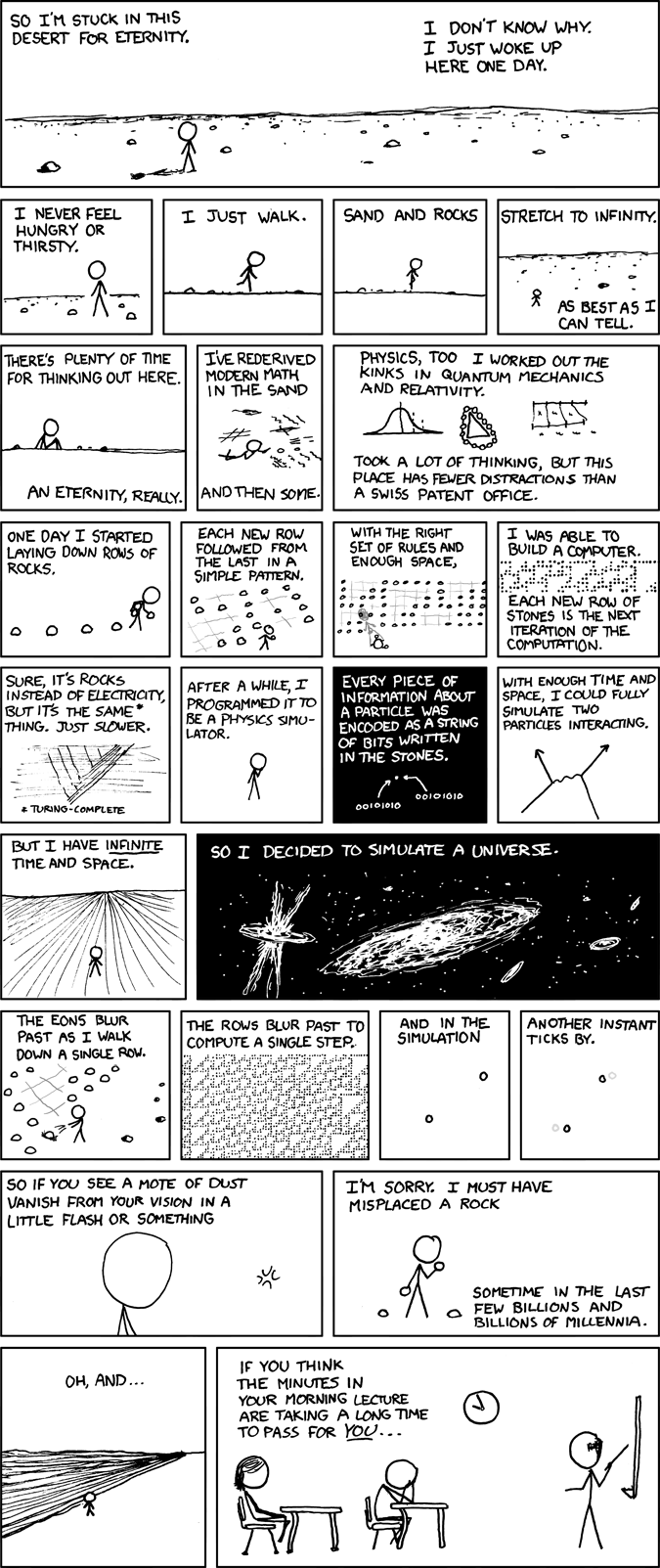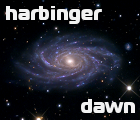|
Is the universe a simulation?
|
|
| H2Bro | Date: Saturday, 06.10.2012, 12:09 | Message # 1 |
|
Astronaut
Group: Users
 Norway
Norway
Messages: 51
Status: Offline
| In quantum physics there is something known as the observers paradox, whereby a physical system only adopts a specific state when it is being observed. Up until that point, it can be literally either or both or all other states at once.
Additionally, experiments to detect gravitational waves have produced results showing space time is at some level 'pixelated', meaning there is a graininess beyond which one cannot get finer resolution.
Both of these are reminiscent of the idea that a computer simulation, like SE for example, only loads graphics / images / information - in other words, only constructs a definite physical state - when it is investigated by an observer. Also, there is an ultimate limit to the max resolution.
You have all likely heard of 'quantum computing' whereby the quantum states of particles are used to encode bits of information. Part of the difficulty of quantum computing is that heisenbergs uncertainty principle means its quite easy for you to lose or disrupt the information stored in a quantum bit (qubit) simply by trying to read it. This is like a hard disk whose memory changes whenever you open a folder.
Our efforts at quantum computing are difficult because of technological limitations. The physical reality of the system, however, already encodes information all by itself. There is a law of thermodynamics that basically means information cannot be destroyed. In any physical system, say, a box of gas, if you know perfectly the position and momentum of all particles at one point in time, as well as the rules governing those particles, you can 'run forward' or 'rewind' the system to any desired point. Again, we can't do this because of technological limitations, but in theory you can get back to or forward to any point of time for the box of gas by knowing one slice of the physical state and applicable rules.
This brings us to my main point. The physical system itself is not limited by technology in its capacity to process and compute information. If the position and momentum of each molecule in a box of gas represent stored bits of information, and the rules that govern how they bounce off each other are analogized to the logical dependencies in programming, then simply letting the gas bounce around in the box is in essence 'computing' some program. The information is being manipulated by a discrete set of rules to produce determined outcomes.
Extend this analogy to everything. If one knew perfectly the rules governing all physical reality, and in a closed parsec of space there was say a large cloud of hydrogen, one would be able to compute forward exactly what would happen all the way to the formation of life and organisms. This is simply running the program forward. Its more complicated than a box of gas, but not fundamentally different. Whether the actions of conscious or self-conscious beings is also determined by the state of a physical system and a set of rules is a question being investigated by neuroscience. So far, the answer seems to be yes, but thats besides the point.
Lets say physical systems compute information. What is the computational capacity of the universe? Well, each qubit of matter can hold exactly the number of bits of information that describe itself. For some electron this might be spin, position, momentum, and mass. Recall, however, that any qubit only takes on discrete physical values when being observed. When it is not observed, the physical information is undefined, literally. It can be and is any value. This is what physicists mean when they say a quantum wavefunction collapses when observed (up until that point the physical state is only probabilistically defined).
If the universe is a computer, it is precisely capable of computing itself because the computational capacity of each computing component is enough to define its own physical state - IF IF IF IF !! all computing components are observed simultaneously. If not observed, the states are undefined and do not need to be simulated. This means the qubits are free to compute something else, some higher dimensional program or information - whatever.
Of course, it is impossible to observe all physical states in the universe at once even theoretically, because the tool of observation is comprised of potential qubits that themselves are not observed. This means at any time there are free cycles in the universal computer to perform other tasks.
Another implication is that physical states are undefined until observed, and any unobserved physical state can perform computational tasks to support the load demand of observed states. In other words, the actual universe is procedural, much like SE. That is, if SE ran its own tasks using unobserved parts of the universe.
TL/DR, too much coffee.
i3 370M 2.3Ghz ATI Radeon 5650 8GB DDR3 Win 7 (runs SE suprisingly well for a laptop!)
|
| |
| |
| Blu3sman | Date: Saturday, 06.10.2012, 13:01 | Message # 2 |
 Space Tourist
Group: Users
 Ukraine
Ukraine
Messages: 28
Status: Offline
| I didn't observe your post, it is very easy to read and understand. And it is not.
|
| |
| |
| H2Bro | Date: Saturday, 06.10.2012, 14:24 | Message # 3 |
|
Astronaut
Group: Users
 Norway
Norway
Messages: 51
Status: Offline
| I'm sorry, what?
i3 370M 2.3Ghz ATI Radeon 5650 8GB DDR3 Win 7 (runs SE suprisingly well for a laptop!)
|
| |
| |
| H2Bro | Date: Saturday, 06.10.2012, 14:34 | Message # 4 |
|
Astronaut
Group: Users
 Norway
Norway
Messages: 51
Status: Offline
| If anyone is interested in the more technical side of this perspective, here is a great paper on the computational capacity of the universe.
http://arxiv.org/abs/quant-ph/0110141
i3 370M 2.3Ghz ATI Radeon 5650 8GB DDR3 Win 7 (runs SE suprisingly well for a laptop!)
|
| |
| |
| Antza2 | Date: Saturday, 06.10.2012, 14:40 | Message # 5 |
 World Builder
Group: Global Moderators
 Finland
Finland
Messages: 1049
Status: Offline
| Umm...

Go to antza2.deviantart.com for cool photos!
|
| |
| |
| Voekoevaka | Date: Saturday, 06.10.2012, 14:46 | Message # 6 |
 World Builder
Group: SE team
 France
France
Messages: 1016
Status: Offline
| 
Quote (H2Bro) Additionally, experiments to detect gravitational waves have produced results showing space time is at some level 'pixelated', meaning there is a graininess beyond which one cannot get finer resolution.
I need a reference on this point.
H2Bro, what do you think about the role of the observer in quantum mechanics ?
In what goal could be make such a simulation ?
Is there, in the "real" world, a god-like programmer, saying : "I gonna program something new : firstly, there will be particles :
Code public class particle{
private int spin;
private int charge;
private int hypercharge;
private int isospin;
private color color;
private vectorFunction waveFunction;
...
public particle(int s, int h, int i, color c, vectorFunction f){
spin = s;
hypercharge = h;
isospin = i;
color = c;
waveFunction = f;
charge = isospin + hypercharge/2;
}
public vector getPosition(){
vector position = new randomVectorFromLaw(waveFunction);
waveFunction = dirac(position);
return position;
}
public vector getSpeed(){
vector speed = new randomVectorFromLaw(waveFunction.fourierTransform());
waveFunction = e^(i.speed.scalarProduct(x));
return speed;
}
public vectorFunction getWaveFunction(){
return waveFunction;
}
public void setWaveFunction(vectorFunction f){
waveFunction = f;
}
...
}
Yeah. I will them Fermions ! Let them interact... How I can do this ? I can create other particules, and I will call them Bosons. What a good name, Boson !
So, get a look to the main class :
Code public class myUniverse{
public int main(){
particle[] allTheParticleOfTheUniverse;
allTheParticlesOfTheUniverse[1] = new particle(...
...
for(int n = 0; n > 'a very big number'; n++){
for(int i = 0; i = allTheParticlesOfTheUniverse.length(), i++){
allTheParticlesOfTheUniverse[i].setWaveFunction((allTheParticlesOfTheUniverse[i]).getWaveFunction()-i*δt*((allTheParticlesOfTheUniverse[i]).getWaveFunction()).laplacian()/(2*planckReducedConstant*(allTheParticlesOfTheUniverse[i]).getMass());
...
}
...
}
}
Okay ! Let's just finish my work by allowing complex structures to wonder what they are doing here !"
Want some music of mine ? Please go here !

Edited by Voekoevaka - Saturday, 06.10.2012, 14:48 |
| |
| |
| HarbingerDawn | Date: Saturday, 06.10.2012, 14:54 | Message # 7 |
 Cosmic Curator
Group: Administrators
 United States
United States
Messages: 8717
Status: Offline
| Quote (H2Bro) if you know perfectly the position and momentum of all particles at one point in time, as well as the rules governing those particles, you can 'run forward' or 'rewind' the system to any desired point
This concept is referred to as "Laplace's demon"; you can read about it (and why it doesn't work) here.
Some things are always fundamentally unpredictable. You don't know what effect the creation and destruction of small quantum particles in the space inside the box, or radioactive decay, has had on its evolution, and those events cannot be predicted. It is currently accepted that even if you know the exact properties of every piece of matter and energy in the universe, you still cannot create a completely accurate simulation of it throughout time since there will always be things about that universe that are unpredictable (and also because it is physically impossible to utilize nearly that much computing power).
Quote (H2Bro) If one knew perfectly the rules governing all physical reality, and in a closed parsec of space there was say a large cloud of hydrogen, one would be able to compute forward exactly what would happen all the way to the formation of life and organisms.
If you knew perfectly the laws of the universe, yes you could predict every action those atoms and molecules would have on each other. The problem is that they are being affected by forces and matter from outside that volume, which the simulation could not take into account without expanding itself to encompass a larger volume. The only way you could get to a point of having no outside influence is if your simulation encompassed the entire universe. It is physically impossible to compute this much information in this universe (you would require other universe to be able to run the computations). So the simulations you're talking about are not even theoretically possible.
Quote (H2Bro) This means at any time there are free cycles in the universal computer to perform other tasks.
Like the one's being used by our brains and our computers to have this discussion  (just kidding) (just kidding)
I get the sense that your whole argument here depends on the idea that the exact properties of matter are undefined (unknown) unless observed. But I don't see what difference this makes. Doesn't the matter have exact properties that exist, and are just undefined to the observer since they are unknown to them? A piece of matter may be simultaneously in two states from a standpoint of statistical probability, and so need to be considered to have both of those states, but I know of no empirical data that suggests that it really does simultaneously have both states (though I admit that my knowledge and understanding of quantum mechanics is limited).
Quote (Blu3sman) I didn't observe your post, it is very easy to read and understand. And it is not.
What does this mean? Unless it's a joke referencing uncertainty?
All forum users, please read this!
My SE mods and addons
Phenom II X6 1090T 3.2 GHz, 16 GB DDR3 RAM, GTX 970 3584 MB VRAM
|
| |
| |
| H2Bro | Date: Saturday, 06.10.2012, 15:07 | Message # 8 |
|
Astronaut
Group: Users
 Norway
Norway
Messages: 51
Status: Offline
| Quote (Voekoevaka) I need a reference on this point.
Here you are: http://arxiv.org/abs/0812.1285
Your coding there cracks me up. I've yet to develop much programming skills, but I will soon as part of a numerical methods course used for physical calculations. The kinds of things you can do with a few lines of code these days would make Laplace weep.
The role of the observer is interesting, how you interpret the observer effect also depends on how you construe probability. If you think probability is the long run odds or average outcomes of reiterated scenarios, then indeed the fact of observing defining a physical state seems paradoxical - if the probability is an objective aspect of the system, then it should come out whatever way it comes out, regardless of if someone is watching.
Taking a Bayesian perspective of probability makes the observer issue less thorny. Bayesianism basically says probability is the observers belief that the frequency of outcome will be x or y or whatever, therefore probability is inherent in the observer, not the system. For quantum systems, the quantum systems themselves are encoding subjective states of knowledge when we go out and measure them, because the nature of quantum systems does not yield full information to all queries like classical mechanical systems.
This puts the divide between people who think the observer paradox stems from how we consider observer - system interactions, and a non-paradox where subjective experiences of outcomes lead us to think there is such a thing as "objective" probability.
I'm doing a bad job of explaining this, so I'll link you to this article http://arxiv.org/abs/quant-ph/0106133
i3 370M 2.3Ghz ATI Radeon 5650 8GB DDR3 Win 7 (runs SE suprisingly well for a laptop!)
|
| |
| |
| H2Bro | Date: Saturday, 06.10.2012, 15:27 | Message # 9 |
|
Astronaut
Group: Users
 Norway
Norway
Messages: 51
Status: Offline
| Quote (HarbingerDawn) It is currently accepted that even if you know the exact properties of every piece of matter and energy in the universe, you still cannot create a completely accurate simulation of it throughout time since there will always be things about that universe that are unpredictable
One might argue that at the more basic level, these unpredictable aspects of the universe are the result of the difficulties of trying to run simulations of a physical system within that physical system (i.e., my computer cannot simulate a copy of my computer because parts of my computer are 'non-computing infrastructure' to the computation. This is not the case in an ideal material composed solely of self-reading/writing qubits, called 'computronium') .
Here thermodynamics and uncertainty put a hard constraint on your computational capacity, again because we need technology to 'read out' the data. Put another way, to simulate precisely the physical system of the earth you would need a block of computronium the size of the earth that has perfect data capture and recall. Additionally this computronium and the earth would need to be co-located else there is time lag and the problem of read/write mechanisms. What does this imply...?
Quote (HarbingerDawn) If you knew perfectly the laws of the universe, yes you could predict every action those atoms and molecules would have on each other. The problem is that they are being affected by forces and matter from outside that volume, which the simulation could not take into account without expanding itself to encompass a larger volume.
Here you need to see that the parsec was an example, and indeed I extend the thought experiment to the whole universe.... So saying 'there are external influences to your thought experiment' is really objecting to the foreplay of the thought experiment, on not the experiment itself.
So what IS the crux of my argument? Take a look at the 'computational capacity of the universe' article, and read the introduction. What I am trying to say is that these findings can be stood on their head, to basically say...
Physical systems ARE computation. The level of computability inherent in physical systems is exactly sufficient to simulate themselves if they are perfectly observed, and therefore have perfectly defined states. My example with the earth and computronium is a lead on - the computronium IS the earth, they are identical, in fact they are by definition identical because no other physical system apart from the Earth could simulate its happenings.
My argument that there are excess / free cycles of computation rests on a particular interpretation of the observers effect in quantum mechanics. Here I am saying states are undefined unless observerd. This is one take on the matter. Another would be that the knowable information of a quantum state is undefined unless observed. Therefore the system has definite values but they are unknown to us.
An analogy can be drawn with brains and thoughts that might be helpful. You cannot conceive of an image so complex it represents your mind in its entirety because some aspect of your brain - the organ doing the conceiving - is taken up with suppling infrastructure to the parts doing the thinking. So even if all thinking material could think of itself, perfectly, it is insufficient because they rely on non thinking capillaries, etc.
Here is a quote I like on this matter:
"If the human mind were so simple that we could understand it, we would be so simple that we could not"
This point was tangential, so I respond to it here below...
Quote (HarbingerDawn) I get the sense that your whole argument here depends on the idea that the exact properties of matter are undefined (unknown) unless observed. But I don't see what difference this makes. Doesn't the matter have exact properties that exist, and are just undefined to the observer since they are unknown to them? A piece of matter may be simultaneously in two states from a standpoint of statistical probability, and so need to be considered to have both of those states, but I know of no empirical data that suggests that it really does simultaneously have both states
You can read up on quantum entanglement for empirical evidence that simultaneous states co-exist until observed. This entanglement works across space, and as some australian physicists have demonstrated recently, time as well.
i3 370M 2.3Ghz ATI Radeon 5650 8GB DDR3 Win 7 (runs SE suprisingly well for a laptop!)
|
| |
| |
| HarbingerDawn | Date: Saturday, 06.10.2012, 15:33 | Message # 10 |
 Cosmic Curator
Group: Administrators
 United States
United States
Messages: 8717
Status: Offline
| Quote (H2Bro) Here you need to see that the parsec was an example, and indeed I extend the thought experiment to the whole universe..
Ah, I didn't know that you just meant it to establish principle before leading up to your point. Sorry.
All forum users, please read this!
My SE mods and addons
Phenom II X6 1090T 3.2 GHz, 16 GB DDR3 RAM, GTX 970 3584 MB VRAM
|
| |
| |
| H2Bro | Date: Saturday, 06.10.2012, 15:36 | Message # 11 |
|
Astronaut
Group: Users
 Norway
Norway
Messages: 51
Status: Offline
| There is a weakness to the argument, Harbringer, and you're already on to it.
i3 370M 2.3Ghz ATI Radeon 5650 8GB DDR3 Win 7 (runs SE suprisingly well for a laptop!)
|
| |
| |
| Voekoevaka | Date: Saturday, 06.10.2012, 16:01 | Message # 12 |
 World Builder
Group: SE team
 France
France
Messages: 1016
Status: Offline
| Quote (HarbingerDawn) If you knew perfectly the laws of the universe, yes you could predict every action those atoms and molecules would have on each other.
I don't think so. There are two obstacles on the way. The first one is the importance of chaos. Take the 2-body problem for instance : there are two objects linked by a 1/d² force. You can solve the Binet's formula to find an exact solution, that takes values for all time. But when the number of objects is over 3, the problem is chaotic : the only way to find the exact solution is by computing a power series, with a very (very) very slow convergence. Instead of that, you can approach it numerically, but the result you obtain is not the exact value, just an approximation, and a slight change of the initial values or the algorithm have enormour consequences on the result.
Then the second obstacle is the quantic noise. The Heisenberg principle says that if you know the position of a paticle, its speed can't be known. You can find just a density of probability... But quantum mechanics are just a model. No one known I there are exact predilections behind the quantic uncertainty (behind the Planck wall).
Quote (H2Bro) The role of the observer is interesting, how you interpret the observer effect also depends on how you construe probability. If you think probability is the long run odds or average outcomes of reiterated scenarios, then indeed the fact of observing defining a physical state seems paradoxical - if the probability is an objective aspect of the system, then it should come out whatever way it comes out, regardless of if someone is watching.
I prefer your second assertion. Your first affirmation tells that the probabilities are empirically, but in quantum mechanics, these probabilities are well defined : there are equal to the square modulus of the wave function. And the wave function of a particle is objective.
The observer paradox can have several solutions :
- Maybe there is something that determine exactly where we will find the particle when we observe it, but this belong to a theory that is over quantum mechanics.
- Maybe the observators can influence the systems because they didn't belong to the same space-time. This is in favor of the existence of the soul, independant from the matter.
- Maybe (and this is the most accepted hyphothesis) all the cases come true, in different parrallel worlds. The moment when the exact position of the particle isn't defined yet correspounds to the moment when all the parrallels worlds aren't splitted form each other.
Want some music of mine ? Please go here !

|
| |
| |
| Antza2 | Date: Saturday, 06.10.2012, 16:32 | Message # 13 |
 World Builder
Group: Global Moderators
 Finland
Finland
Messages: 1049
Status: Offline
| Quote (HarbingerDawn) Some things are always fundamentally unpredictable. You don't know what effect the creation and destruction of small quantum particles in the space inside the box, or radioactive decay, has had on its evolution, and those events cannot be predicted. It is currently accepted that even if you know the exact properties of every piece of matter and energy in the universe, you still cannot create a completely accurate simulation of it throughout time since there will always be things about that universe that are unpredictable (and also because it is physically impossible to utilize nearly that much computing power).
This is obviously because the creators of the current simulation don't want us creating a simulation inside their simulation. 
Go to antza2.deviantart.com for cool photos!
|
| |
| |
| HarbingerDawn | Date: Saturday, 06.10.2012, 16:37 | Message # 14 |
 Cosmic Curator
Group: Administrators
 United States
United States
Messages: 8717
Status: Offline
| Quote (Voekoevaka) I don't think so. There are two obstacles on the way.
If you perfectly knew the laws of the universe and had unlimited computing power and unlimited knowledge of the exact conditions of all the matter/energy at a specific instant, then you could account for those obstacles.
Quote (Antza2) This is obviously because the creators of the current simulation don't want us creating a simulation inside their simulation.
They must be pretty pissed about SpaceEngine then 
All forum users, please read this!
My SE mods and addons
Phenom II X6 1090T 3.2 GHz, 16 GB DDR3 RAM, GTX 970 3584 MB VRAM
Edited by HarbingerDawn - Saturday, 06.10.2012, 16:37 |
| |
| |
| Antza2 | Date: Saturday, 06.10.2012, 16:41 | Message # 15 |
 World Builder
Group: Global Moderators
 Finland
Finland
Messages: 1049
Status: Offline
| Quote (HarbingerDawn) They must be pretty pissed about SpaceEngine then
One day one of the creators of the simulation finds out about SpaceEngine, goes to folder containing SpaceEngineers data and presses "Shift + Delete". 
Go to antza2.deviantart.com for cool photos!
|
| |
| |